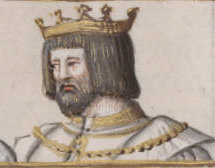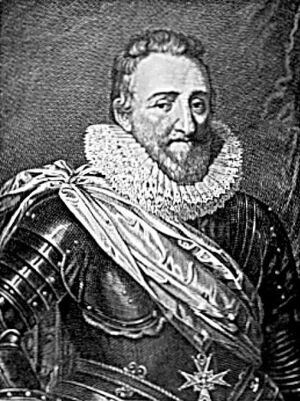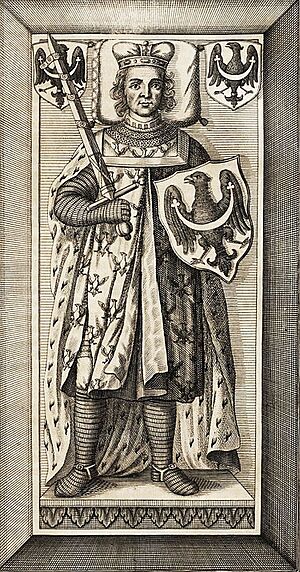Henry IV facts for kids
Henry IV can refer to several important historical figures and even famous plays! Many powerful leaders throughout history have been named Henry IV. This page will help you learn about some of the most well-known ones.
Contents
Henry IV of England
Henry IV of England (born 1367, died 1413) was the King of England from 1399 to 1413. He was the first king from the House of Lancaster. His father was John of Gaunt, a very powerful son of King Edward III.
Henry IV became king after he took the throne from his cousin, King Richard II. This was a big event in English history. During his reign, Henry faced several challenges, including rebellions from powerful nobles. He worked hard to keep control of his kingdom and establish his family's right to rule.
Early Life and Exile
Henry was born at Bolingbroke Castle in Lincolnshire, England. He was known as Henry Bolingbroke before he became king. He was a skilled knight and participated in crusades. However, he had a difficult relationship with King Richard II. In 1398, Richard II exiled Henry from England.
Becoming King
While Henry was in exile, his father died. King Richard II then took Henry's inheritance. This made Henry very angry. In 1399, Henry returned to England with an army. Many people supported him, and he quickly gained power. King Richard II was captured and later died in prison. Henry was then crowned King Henry IV.
Challenges as King
Being king was not easy for Henry IV. He faced many rebellions, especially in the early years of his rule. One of the most famous was the rebellion led by Owain Glyndŵr in Wales. Henry also had to deal with powerful families like the Percy family. Despite these challenges, he managed to keep his throne.
Legacy of Henry IV
Henry IV's reign was important because it marked the beginning of the Lancastrian dynasty in England. He helped to strengthen the power of Parliament, which became more involved in governing the country. His story is also famously told in plays by William Shakespeare.
Henry IV of France
Henry IV of France (born 1553, died 1610) was the King of France from 1589 to 1610. He was also King of Navarre from 1572. He was the first French king from the House of Bourbon. Henry IV is often remembered as "Good King Henry" because he brought peace and stability to France after many years of religious wars.
France had been torn apart by the French Wars of Religion between Catholics and Protestants (Huguenots). Henry, who was a Protestant, became king during this difficult time. To bring peace, he famously converted to Catholicism, saying, "Paris is worth a mass."
Ending the Wars of Religion
One of Henry IV's most important actions was issuing the Edict of Nantes in 1598. This edict granted significant rights to Protestants in France. It allowed them to practice their religion freely in certain areas and hold public office. This was a huge step towards religious tolerance and helped to end decades of conflict.
Rebuilding France
After the wars, Henry IV focused on rebuilding France. He worked to improve the economy, encourage farming, and build new roads and bridges. He also tried to make life better for ordinary people. He had a famous wish that every peasant would have "a chicken in his pot every Sunday."
Family and Succession
Henry IV married Marie de' Medici and had several children, including his son Louis XIII, who became king after him. Henry IV was a popular king, but he was sadly assassinated in 1610. His reign is seen as a time when France began to recover and become a stronger nation.
Henry IV, Holy Roman Emperor
Henry IV, Holy Roman Emperor (born 1050, died 1106) was the King of Germany from 1056 and Holy Roman Emperor from 1084 until he was forced to step down in 1105. He is famous for his long and difficult conflict with Pope Gregory VII, known as the Investiture Controversy.
This conflict was about who had the power to appoint bishops and other church officials – the emperor or the Pope. It was a major struggle for power between the church and the state in medieval Europe.
Early Life and Reign
Henry became king when he was very young, only six years old. This meant that others ruled for him until he was old enough. When he took full control, he wanted to strengthen the power of the emperor over the nobles and the Church.
The Investiture Controversy
The main disagreement between Henry IV and Pope Gregory VII was over "investiture." This was the act of giving a bishop the symbols of his office, like a ring and a staff. The Pope believed only he had this right, while Henry believed that as emperor, he should have a say in who became bishops in his lands.
The conflict became very intense. Pope Gregory VII even excommunicated Henry IV, meaning he was cast out of the Church. This was a very serious punishment in those times.
Walk to Canossa
In 1077, Henry IV famously traveled to Canossa in Italy to beg the Pope for forgiveness. He stood barefoot in the snow for three days outside the castle where the Pope was staying. This act of humility eventually led the Pope to lift the excommunication. However, the conflict continued for many more years.
Later Years and Legacy
Henry IV faced many challenges throughout his reign, including rebellions from German nobles and continued struggles with the Church. He eventually died in 1106. The Investiture Controversy was a very important event that shaped the relationship between rulers and the Church for centuries.
Henry IV Probus
Henry IV Probus (born around 1258, died 1290) was a powerful duke in Silesia, a region that is now part of Poland and the Czech Republic. He was known for his ambition and his efforts to become King of Poland.
Henry IV Probus was a member of the Piast dynasty, an important ruling family in Poland. He was Duke of Wrocław and later also Duke of Kraków.
Ambition for the Polish Throne
At this time, Poland was divided into many smaller duchies. Henry IV Probus wanted to unite these lands and become the King of Poland. He was a strong leader and a skilled military commander. He managed to gain control of Kraków, which was a very important city in Poland.
Cultural Patronage
Henry IV Probus was also a patron of the arts and culture. He supported writers and artists, and his court was a center of learning. He was known for his love of poetry and for being a chivalrous knight.
Death and Succession
Henry IV Probus died in 1290. His death was sudden and some people believed he was poisoned. He did not achieve his goal of becoming King of Poland, but his efforts were part of a larger movement to unify the country.
Shakespeare's Henry IV Plays
William Shakespeare, the famous English playwright, wrote two historical plays about King Henry IV of England:
- Henry IV, Part 1
- Henry IV, Part 2
These plays are not just about history; they are also about growing up, friendship, and the challenges of being a leader.
Henry IV, Part 1
Henry IV, Part 1 focuses on the early years of King Henry IV's reign. It shows the king dealing with rebellions, especially from the powerful Percy family, led by the fiery young nobleman Hotspur.
The play also features Prince Hal, the king's son and future King Henry V. Hal spends a lot of time with a fun-loving, mischievous knight named Sir John Falstaff. The play explores the contrast between the serious world of politics and war, and the carefree life of Prince Hal and his friends.
Henry IV, Part 2
Henry IV, Part 2 continues the story of King Henry IV's reign and Prince Hal's journey. The king is older and sicker, still facing rebellions. Prince Hal slowly begins to leave his wild ways behind and prepare for his future role as king.
The play shows Hal's difficult decision to leave his old friends, including Falstaff, as he takes on the responsibilities of the crown. It's a story about growing up and understanding what it means to be a true leader.
See also
 In Spanish: Enrique IV para niños
In Spanish: Enrique IV para niños 




